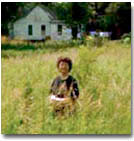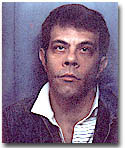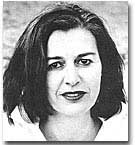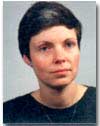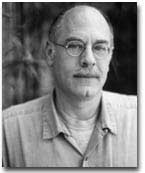
THE QUESTION
For this issue's Forum Kathy Lou Schultz and Robin Tremblay-McGaw address issues of class and poetics: "Thanks to the efforts of feminist poets, critics, and editors, it is now possible to identify a discourse – both scholarly and creative – of gender and poetics. In the 1980s, journals such as HOW(ever) put the spotlight on these issues, particularly as related to innovative or experimental practices and how these intersected with issues of publication, erasure, and canon formation.
A decade later, we find ourselves trying to define a vocabulary for addressing complex issues of class in the formation of an innovative poetics. As Kathy Lou Schultz asked in her Tripwire (N.1, Fall 1998 & appearing in this issue of HOW2) essay, "What's a working class poetic, and where could I find one?" How do we make present the "absence" of class in discussions of gender and the poetics of innovation? Where are the intersections of race in discussions of class? How are these forces fused or CON-fused?
How do/can we picture/trace working class issues in formally innovative ways? What do the circumstances of literary production – surrounding writers and the writing produced – have to do with one another?"
HOW2 Forum: Class & Innovative Writing
Defining "class" and "working class poetry"
The space provided by this forum is hardly large enough even to name the beast, let alone to say something significant about it. And "working class" may be too narrow a term to use here, when what we're really talking about are perceptions of various states of suppression and exclusion. The term I prefer is "lower classes" (emphasis on the plural), which includes not only people of urban working class backgrounds, but also the chronically unemployed and the rural poor, who have certain life circumstances and expectations in common, as well as some common aesthetic preferences.
When it comes to literary production, class pervades every aspect of it. For people of the lower classes, the common denominator is "have-not" status, starting with the glaring absence of the middle/upper class assumption that it is always possible to achieve what one desires. There's a lack of cash to support money-losing ventures such as poetry magazines and small presses (owner/editorship of which gives one instant recognition). There's a lack of access to the Internet, where one can hobnob with publishers and magazine editors (publication being determined partly by who you know: For example, this particular essay appearing in this particular forum is a result of having met someone [Kathy Lou Schultz] at an academic conference and having contributed to an Internet discussion).
An even more basic lack is that of access to the kind of education that can equip one with an understanding of which particular aesthetic modes of thought and presentation are valued and which are not, an education that trains one to produce in those modes, while also providing the skills needed to innovate and rebel against them.
Even if one achieves access to these things, there are still difficulties. Whose aesthetic values should an individual lower class poet be willing to accept? While disjunctive techniques seem to be commonly enjoyed and employed by all contemporary poetic "innovators," I've noticed some differences in other aesthetic components that seem to fall along the old academic/non-academic (and therefore also class) lines. For example, why does the tone of so many "innovative" poetry magazines seem to be dominated by an intellectual, white-sounding verbal style, with lots of iambs and not much syncopation? Why are emotion, pathos, and melodrama (of which I am quite fond, and which fondness I believe is due in part to a lower class background) discounted, while philosophical conundrums are praised? Why shouldn't we be free to utilize the full range of expression available to us as human beings – the emotional and particular as well as the abstract and philosophical, cacophonous as well as harmonious? Must all of our poetic endeavors "reek of brains" (as a friend once put it) in order to be valued?
Questions like those lead to the one asked by the editors of this forum: "What is 'working class' poetry?" For me, it's all of the poetry, whether mainstream or avant garde, written by people who identify themselves as working class, particularly when it deals with the dynamics of economic and cultural power hierarchies and their effects on us as a class (and as individuals), and that expresses our resistance to them. I, as an individual, tend to prefer innovative styles of poetry because they can so effectively express the sense of disconnectedness, disturbance, distortion, difficulty, and disaffection that often results from life in the lower classes.
BIO:
Bobbie West grew up on a farm in Illinois. After drifting into various jobs as a waitress, union machinist, teacher, and translator, she discovered poetry. Since then, her writing has appeared in a variety of literary magazines. She's the author of a chapbook, Scattered Damage (Meow Press, 1998), and assistant editor of A Wild Salience: the Writing of Rae Armantrout, forthcoming from Burning Deck Press. Currently, she works at a public library in the San Diego inner city neighborhood where she lives.
(Photo
by
Craig Goodman)
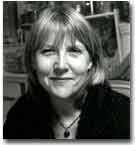 DODIE
BELLAMY
DODIE
BELLAMY
Whether I like it or not, I am a product of the San Francisco writing community. For the past 20 years this community has nourished and incensed me. Any ideas I have about class in my own writing are framed by my class experience within this community, a community whose class politics I don't have much good to say about. Presenting my critique of (my fantasy of) this middle class writing scene, I fear, is a losing proposition. "She's such a whiner," people will scoff. I've seen this happen time and again when such critiques come up on the SUNY Buffalo Poetics List. I, and many other working class people, have been helped by this scene (trained, given access and encouragement) but treated badly by it as well (kept on the peripheries, tolerated rather than accepted, denied difference). This treatment has a different flavor than the coddling and patronizing writers of color endure. Being working class is like being fat. It's your own fault. You'd do something about it if you really cared about yourself.
When I was a young writer I went through a rigorous period of training. My manner and public presentation, as well as my writing, were minutely critiqued. "Writing is a middle class occupation," a Marxist friend told me. "If you want to be a writer, Dodie, you've got to learn to be more middle class." Another mentor volunteered that my brown eyeliner was too harsh. "D. and I have been discussing your eyeliner, and we think that green might work better." I feel a lot of anger about this interaction–particularly when I'm in PMS and thrashing about for something to obsess about. An appalling overtness that resonates with the thousands of other more covert messages received in the past twenty years. I see bald, disapproving moon-heads, straight out of a Sylvia Plath poem. They scowl at my social coarseness, my primitive, black and white value system–the way I pouted and scoffed when my teachers suggested I make friends with people who will "do you some good." This standard operating procedure in a community that's jousting for power is dishonest in a working class context, where there is so little power to be had. It's not like you never see such "networking" there, but it is considered BAD. I tend to think of middle class people as immoral and fussy. "Corn cobs stuck up there asses," as my mother would say.
Whenever I see a cheap (white) woman on the street–not some trendoid doing cheapness, but a really unselfconsciously cheap woman–I get a sexual thrill, I stare and stare at her blue eyeshadow, her inch-long rhinestoned nails, lipstick stained cigarette, hairspray, too tight jeans, pasty cleavage, my eyeballs bulge with staring. Lacy thong bikini, I'm sure of it. My "novel" The Letters of Mina Harker, is the place where I get to be that cheap woman–if she had a voice, if she had years of training. Mina is a place where I get to rip loose, to be vulgar, unruly, to shit all over everything, to wail like a hysterical baby, to brandish the hatchet humor I was raised with. Much of the permission for wallowing in all this primalness comes from Lacanian theory. In Mina my Lacanian desire is twofold: I wanted to both enact the delicious twistedness of his theories and to subvert previous "prissy" feminist enactments. At this point, however, I can make no clean separation between these feminists and me–neither inside nor outside of my writing. Compared to the women I was raised with, I've become "prissy" myself. One cannot spend one's entire adult life living and working among a middle class intelligentsia without being tainted. Clashings and slippages of class codes generate energy, excitement. Look at Audrey Hepburn in movie after movie, madly changing from flower girl to lady, from bookseller to supermodel, from chauffeur's daughter to millionaire's wife, from farm wife to bohemian, from princess to vacationing nobody. If Audrey stayed put, nothing interesting would ever happen to her! Gowns by Edith Head, romance by Gregory Peck, book by Hard Press, fountains by Rome. It's all been worth it, I tell myself.
BIO:
Dodie Bellamy is the author of The Letters of Mina Harker (Hard Press, 1998). She is a visiting writer of fiction at Mills College.
The Zone Above Hunger
Since the rise of the warrior city-states, the controlling bureaucracies have exerted a trenchant power over the populations within their purview. An artificially divided strata arose from this world view, and a "demand for menial labor" became paramount. Under such an auspices a select few were automatically absolved of the ulterior puzzle of day-to-day sustainment. But for the vast majority the issue of hunger and general dearth has maintained itself as the mantra of a negative epic. And it is within this epic that the majority of the populace in the West has been born.
From the 1760s onward a working class has evolved from the industrial epoch. A class, worked to its teeth in order to maintain a modicum of raiment and shelter. And it is this latter condition into which I was born, always near the margins, at times, only an eyelash from penury.
But as an artist, a poet, one does not have to curtail one's power in order to evoke the suffering which comes from material deficiency. Inner radiance cannot be curtailed by the stones one has to sup with one's bread. One can look at Rimbaud or Blake, at Cesaire or Bob Kaufman, to see that the mind cannot be contained within the provinces of hunger. And this is not to say that the reality of poverty has no life in letters, or that the imagination is elitist. By no means. But what I speak of is the imaginal power to leap beyond the brutally imposed confines to combat the bureaucracies with an elemental seismics, with a new and alien thinking.
BIO:
Will Alexander's latest book is Above the Human Nerve Domain (Pavement Saw Press). Recent and forthcoming work is in Callaloo, Witz, Fence, Syllogism, Sulfur, and Hambone. A novella is forthcoming from Green Integer Press. He lives in Los Angeles.
 DAVID
ZAUHAR
DAVID
ZAUHAR
A Note On Poetry
And Class: And/Or, How To Use Pierre Bourdieu's Distinction
As A
How-To Manual
Ted Berrigan already knew how. As Alice Notley says in her introduction to Berrigan's selected poems, "Ted came from a working class background and was very realistic about choices in America. You weren't poor if you had gone to college. On the other hand, you would not get certain kinds of poetic recognition in your lifetime if you had gone to Something State instead of Harvard." Or as Pierre Bourdieu puts it, "Cultural objects, with their subtle hierarchy, are predisposed to mark the stages and degrees of initiatory progress which define the enterprise of culture." A Working Class Avant Garde poetic would be the product of poems and publishing practices that would find itself on the bottom of that subtle hierarchy. But, dear Reader, Bourdieu comes to the rescue: Drawing on the historic practices of "the learned of all religions" and their "treatment of canonical texts," Bourdieu tells us that, "since the levels of 'reading' designate hierarchies of readers, it is necessary and sufficient to change the hierarchy of readings in order to overturn the hierarchies of readers."
In Marx, as in Reality, the Working Class is defined in relation to Capital as those who must sell their labor. In poetry this labor is often offered humbly to those who went to Harvard and not Something State. Here Working Class Avant Gardists can learn from none other than T.S. Eliot: "Can we regret...that Francois Villon did not choose to mix with more respectable society, or that Robert Burns did not have the same schooling as Dr. Johnson?" It might seem strange to quote Eliot, a man now condemned to centuries of fame as the librettist for the longest running Broadway musical of the 20th Century, to support a call for Working Class Avant Garde practices. But he basically got this one right. Villon and Burns didn't write for professors or other commissars. In other words, any Avant Garde that seeks approval of other Avant Gardes isn't Avant Garde (there are no Avant Gardian Angels).
On the SUNY Buffalo Poetics List not long ago, a Working Class poet [Kathy Lou Schultz] intervened in a debate on class and poetry and said in passing that she could "smell class." For this she was chastised by another listmember who seemed to assume that the WC poet was actually UC and thus looking down on the odoriferous huddled masses. I found the rebuke itself to indicate a distinctively privileged assumption, one that could only be made by someone with in-born access to the dominant class and who thus assumed that class differences were only manifested by those BELOW. Rank has its privileges. But several of us knew instantly that what the original poster meant when she said she could smell class, because we know that privilege has its rank.
BIO:
David Zauhar was born in Galesburg, Illinois and spent 22 years in that region. Since then he has lived in Louisiana, Minnesota, Arizona, Rhode Island, Pennsylvania, and Chicago, not to mention one summer in Yellowstone National Park. He is currently writing a dissertation at the University of Illinois at Chicago on poetry and cultural criticism in Cold-War America.
How could a hypothetical
post-modern poetry
foreground the surrounding constraints
of class,
while still remaining "non-representational"?
A few broad generalizations hint at what class might be: there is general agreement that it has something to do with family, something to do with money, something to do with education, and something to do with work. It is in the last of these that poetry might find its real grounding in class, since poetry is a form of work. Ironically, the rigors of traditional, rhymed, formalist poetry displayed a stronger trace of the hand of the workman: the sheer artificiality of a canzone working off ten matched rhymes highlights a labor intensiveness which can disappear into the foreignness of a more abstracted avant-garde.
There is a sculpture by the artist Robert Morris entitled "Box Containing the Sound of Its Own Making." The viewer approaches a decidedly plain wooden crate, closed on all sides, to find that it is emitting a racket of hammering, sawing, and the incidental sounds of construction. Those sounds come from a tape recording playing inside the box, a recording of the accidental noise that went into building the artwork. Morris's sculpture may serve as a model for what a poetry with class/work origins incorporated into it might be.
A truer class/work-oriented poetics would find a way of accentuating the presence of the worker-poet. In two poems published in "ixnay #2," the Philadelphia poet Shawn Walker presents arrangements of an overall sublime or "transcendent" poetry ("silence being in a glass/bowl wherefore artist thou siren"), but beneath each poem, separated by a dividing line, she makes a diary entry-style accounting of expenses ("July 19, 1998 $6.21 @ 7-11, 38th & Chestnut $1.50 Philadelphia Inquirer"). The latter belies the overarching poetical rhetoric of the former, but also underscores the material (class) conditions of the poet-manufacturer responsible, especially owing to the humble or even "lower class" nature of the expenses ("$2.14 Doritos, OJ"). Possibilities such as these begin to offer instances of how a post-modern poetry might acknowledge the constructedness of the poem, and the role of the poet as laborer in a cottage industry factory of verse.
BIO:
Jeffrey Jullich has been published in Shiny, Caliban, Pavement, College English, ACM (Another Chicago Magazine), Poetry, and elsewhere. He has poetry forthcoming in Lit, and book reviews in Rhizome. He was the horoscope columnist for VICE magazine and librettist for an opera called American Lit: Queer Theory (The Hawthorne-Melville Correspondence), which premiered at American Opera Projects.
What is a working-class
poetic, and where can
I find one?
Judy Grahn, in her introduction to her collection The Common Woman, says that the piling-up of many images or events in one poem is characteristic of working-class writing. But of course one characteristic doesn't make a "poetic." I would add that poetry written by someone of poor or working-class origin–regardless of whether the author has obtained a middle-class education or income–is often strongly marked by honesty (the blunt kind) and "disruptive" or "unpleasant" emotions "forbidden" to those with middle-class upbringings: Anger. Bitterness. Self-pity. Finger-pointing. Depression (unless diagnosed and treated – medicalized). Self-aggrandizement which is an obvious antidote against a sense of inferiority. Worldviews or politics often dogmatic (cf. Marge Piercy, Alice Walker).
How do the circumstances of the working-class writer affect the writing produced?
First of all, there will not be a lot of literary production from any one working-class writer – cf. Tillie Olsen – unless under unusual circumstances such as sudden commerical success (cf. Richard Wright, Dorothy Allison).
The working-class poet almost always ends as a writer of prose. In some cases the writer's literary production may include journalism, which should not be overlooked when assessing the work of any writer whose goal, at least some of the time, necessarily had to be money (I'm thinking of Richard Wright, Frank Marshall, Zora Neale Hurston). (We wouldn't ignore the photo-journalism of a fine-art photographer, would we?)
Alternatively, there may be a lot of production of writing (as in journaling) but no publication; the journaling movement has effectively diverted a lot of poor and working-class writers from finding, creating, or making use of, public forums. In addition, poor and working-class writers may not know how one goes about publishing one's work, or how to promote it. They may never see a living, breathing, published writer, much less get to know one. The lack of social/psychological support for their writing will usually also curtail the amount of writing accomplished. It is also hard to persist in asserting that writing is your work when the people around you define "work" as physical labor. In essence, a working-class writer writes without a role model, a mentor, or economic or psychological support. No wonder there are so few of them.
BIO:
Catherine Rankovic is a poet-turned-essayist who works as a newsletter editor, webmaster, astrologer and night-school writing teacher. She lives in St. Louis.
It is my last class of the semester at Lycée Aristide Briand in Chatenay-Malabry, seven miles outside Paris where I teach English to a "remedial" group of youngsters of foreign descent for the most part (Portugese, Spaniards, North Africans, Haitians) who have never been to the capital.
I'd promised the kids a party to finish the year en beauté on the scrubby portable hi-fi: rock 'n' roll 45's and permission to bring in guests. Two stunning beauties enter, patent leather thigh boots and thunderstorm eyes. "C'est ici la boom?" their teen arrogance barely arched into a question mark. Yeah, it would be here where I'm dancing with a diminutive Italian, hands on his shoulders, angled down as if on another floor altogether. We keep to the protocol of correct distance although we've already overstepped the sacrosanct boundaries between class and role so dear to the French rigidities.
Time will tell who's
left behind
when you go your way
& I'll go mine
Bob Dylan prophesies on "Blond on Blond."
The social corral, the herding of the poor, ethnic and racial others has been an integral part of the French educational system whose hegemonic agenda is carried out and solidified by generations of obedient taskmasters serving the best interests of their class.
The day of the party the students and I exchange gifts (a box of candied chestnuts for my little men and a pair of dimestore earrings for me) and taste a little of that illicit pleasure which comes from refusing to cut on the dotted line, from stepping out into a yet unmarked slot (so close to slut they will no doubt say later).
We barely have time to play the B-side before we get busted by Madame la Surveillante Générale who loses her voice the space of a second at the sight of such a breach of decorum. "Why, it's absurd!" she gasps. Class is over. I'm asked to leave. Soon it will be May 68.
BIO:
Chris Tysh teaches creative writing and women's studies at Wayne State University in Detroit. Her books include Porne, Coat of Arms, and In the Name.
(Photo by
Peggy Gertner)
 CAMILLE
ROY
CAMILLE
ROY
Risk is an element of knowing where you are. Think of all the information that pours through your sensible orifices, simply because you are afraid. Class, race, sex: forms of risk. At the risk of sounding facile, it's a marvelous alertness.
It is often proposed that experimental writing has political value because disrupting traditional literary forms is also breaking conventional structures of identity. That's so true it's become truism. It is less apparent (or just less valued) that experimental writing can use the shattering mechanisms of oppression formally. I'm talking about the autobiographical contradiction that happens when you map the breakage of the personal. It's just another aesthetic choice, yet more loaded–I have a stake in the process.
In the hierarchy of aesthetic value, low-valued choices are perhaps the hardest to critically discern. Theory is still a rich white man's luxury, as Ron Silliman told us back in the 80s. Not that I love theory. But experience is still associated with dumb [bodily] suffering, aesthetically unredeemable. (This view seems too silly to mention, but I still hear it and see its effects.)
Class is specifically the social region which has not established its own experimental literary variant. Is this why experimental literary scenes always feel so well-ordered, polite, so back-handed, so middle class? Even stuffy. I don't know. Maybe I'm just cranky. Or maybe it's an artifact of the rules which govern public speech. You get to choose between academic culture or Spoken Word. (Guess which scene of discourse has power.) These divisions create constraints–of audience expectation, critical understanding. It's too familiar because it's a daily theme: limits related to the nausea of crossing social boundaries...How do we get outside?
BIO:
Camille Roy is a writer and performer of plays, poetry, and fiction. Her most recent book is a work of fiction entitled SWARM, published by San Francisco's Black Star Series in 1998 with funding from the San Francisco Arts Commission. Earlier books include The Rosy Medallions (poetry and prose) from Kelsey St Press, published in 1995, and Cold Heaven (plays) from O Books, published in 1993. In November 1998 she was the recipient of a Lannan Writers At Work Residency at Just Buffalo Literary Center. Roy's work is accessible online at the website http://www.grin.net/~minka.
The question regarding the category of (working) class in the context of innovative poetry redirects the view from a single focus on gender, which as Anna Yeatman poignantly formulated, "is always going to be most compelling for those women who do not experience ethnicity, race, and class as additional bases of oppression." (Feminism and the Politics of Difference, Sydney, 1993. p.228) Nevertheless, I felt extremely reluctant to respond to your question–not so much because I think "class" could not prove valuable in the analysis of particular texts by–say Charles Bernstein or Erica Hunt–but because I fear the metamorphosis of this analytical category (as much as race or gender) into a political yardstick sentencing the poetries or poetics apparently "lacking" the awareness of the one or the other (the judgement "lack of class consciousness" smacked definitely of failure in the brand of literary criticism I was originally trained in).
A careful (re)reading of texts within and without the "field" of wo/men's experimental writing might indeed bring some surprises concerning the ways in which the texts will render class intelligible. But many of the innovative texts which do not thematically and/or formally engage with some of the critical categories mentioned above might inspire us to think as much about reading expectations, linguistic categorizing, and their links with social stereotyping. This would depend primarily on how the available texts will be read and contextualized.
It is in this sense, I think, in which Erica Hunt can claim in her "Oppositional Poetics:" "contiguity, as a textual and social practice, provides the occasion to look beyond the customary categories of domestic and international, politics, history, aesthetics, philosophy, psychology, sociology, and so on....As a reading and writing practice, it suggests new syntheses that move out of the sphere of a monoculture of denial; syntheses that would begin to consider the variance between clusters of oppositional writing strategies with respect for what has been achieved by each and a sense of the ground that holds it in place." (Moving Borders. ed. Mary Margaret Sloan, Jersey City, 1998, p. 687.)
BIO:
Kornelia Freitag studied Russian and English in the German Democratic Republic (East Germany) where she also wrote her PHD thesis on Stephen Crane. Since then she has been teaching as an assistant professor at the University of Potsdam, Germany. Her current research focusses on women's poetry and feminist theory. She is working on a booklength project on women's experimental writing in the U.S.
My Two Cents
Every poetics is
a poetics of class.
In thinking about a poetics of class that knows itself, it's instructive to look at the history of feminist poetics. In the first place (if you could call the sixties and early seventies the first place), an innovative feminist poetics seemed to be disallowed. Feminism was content if you were going to make a feminist poem recognizable to feminists or to the avant garde. Formally innovative poems founded on radical politics took their cues from Marxist and socialist critiques which did not include sexuality, gender, or, somehow, class.
At the same time, as Joan Retallack points out in her essay ":RE:THINKING:LITERARY:FEMINISM," "Textual traditions that have enacted and explored modes culturally labeled feminine have oddly – or, as we shall note, not so oddly – been practiced until recently more by men than by women....Perhaps one of the most remarkable things about our present time is that women are finally socially and politically powerful enough to undertake the risks of this feminine challenge in their own texts."
I think Retallack answers Kathy Lou Schultz's question, "What's a working class poetic, and where could I find one?" Women did not will a brand new poetics into being, but claimed existing forms, recognized the feminism in them, and then elaborated on them. I'm describing a kind of territory war where the victor achieves recognition both from herself and from the larger writing scene (and with it a portion of psychic life on which to stage her writing).
When feminist publications like HOW(ever) started gathering innovative poetry already being written by women, I heard complaints that the women were not doing anything "new" formally. But they certainly were, because they brought feminism over the great divide from content to form. Once a critical mass of writing (and assuming) had been achieved, people no longer said that women were not making something new, and "suddenly" disjunct form could be feminist poetics.
I don't think I could look at a page of words and say, Oh, a working class form. A working class poetics must claim part of what is already there, apply it to the disjunctions and silences of class, and build a poetry that brings new meanings and new applications to innovative form. Can we look at avant-garde writing in the 20th century and recognize class as one of its sources?
It is an interesting moment to be thinking about class. Class inequities are more brutal than ever and yet all discussion seems to be silenced by a "mainstream" which is ready to give away zillions of dollars rather than depress itself by addressing homelessness and health care. Can this moment of silence also be a moment of power? I doubt it. If there is to be a poetics of class, it may be founded on the abjection and dissonance that inform genre-bending writing by, say, Lawrence Braithwaite, Camille Roy, and Dodie Bellamy. Are writers, perhaps unknown to each other, already creating a body of work? What do established working class writers like Tom Raworth or Eileen Myles have to say? Or writers who foreground race and class – Juan Goytisolo in Spain, Pierre Gyotat in France? Are there allegiances to be made?
BIO:
Robert Glück's
books include Reader, Jack the Modernist, and Margery
Kempe. He teaches
fiction at San Francisco State University and he has just finished a book
of stories called Denny Smith.
(this issue's table of contents)
